|
|
|
|
|
Very Big Horn System
Updated - 22th. July 2009 - new drivers/horns...
Peter's system consists of two very big 29Hz basshorn driven by 2 pieces PRO 15" Precision Devices woofers
each to about 320Hz and two 2" coax BMS 4592 ND driven horn takes care of the signals above 320Hz.
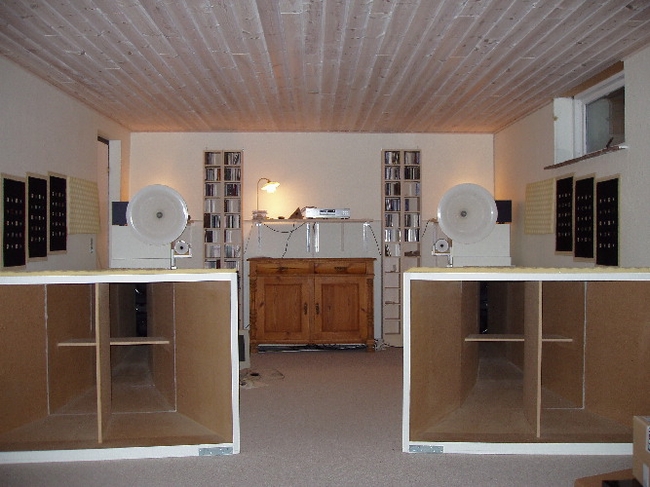
|
Hello,
I have been fooling around with DIY horn speakers for some time now. Being somewhat tired of making endless
and time consuming changes of analog crossovers (active as well as passive), I have been looking for a digital
crossover for quite some time. Several digital crossovers are available for sure, but unfortunately most of them
are simply beyond my financial means. Then I got a chance to pursue a pair of ready-made 'Small Gallery3' protoypes
from GroundSound for about the price of a good quality power amp, and I couldn't resist! Each 'block' consists of
the DCN23 digital filter, power supply, and three mono power amps (2 x PA3CC, and 1 x PA1CC).
Initially, I experienced some low-frequent humm from the 'blocks'. Discussing the problem with Robert, who was very
helpful, it turned out that the voltage in my house occationally went below standards, and that this caused the noise
problems. Robert then kindly modified the power supply to make it immune towards the low voltage I occationally experience.
After the mod the 'blocks' are VERY silent considering that the sensitivity of the speakers is +110 dB/1 watt(!) The low
frequent humm is totally gone now, and even with my ear right next to the tweeter, I can only hear a slight hiss.
How does it sound then? Well, since I have changed crossovers as well as amps I cannot make a direct A/B comparison,
but I can say that I do not miss any of my previous amps! I have recently had several Class D amps: LCAudio ZapPulse 2.2SE,
TacT SDA2175, and Ice powered eAR Two/Enigma. Of these the last two were clearly better than the ZapPulse amp, but I believe
that the GroundSound amps are as good as any of these. Although the TacT and especially the eAR amps sounded very well, there
was in both cases a slight tendency to pronounce the upper midrange to some extent, but this is gone now with the GroundSound
amps. The sound is still clear and clean with a nice sense of 'presence'. Human voices which are notoriously difficult sound
very articulate and natural with these amps.
However, the best part is the digital crossover! The Xover Wizard is very user friendly and it only takes a few minutes to get
an idea of how to setup filters. One VERY handy feature is the option of being able to change the filters while playing music.
When you load a new filter configuration, you just hear that the channel is muted for a moment; then you hear a slight 'click',
and the new filter is on. Thus, comparing different filter configurations is a bliss! Besides, the digital filter gives you so
many attractive options that is out of reach when using conventinal crossovers (time delay, eq, incorporating measurements,
saving old filter configuration, using steep slopes, etc.). To put it short: I will never get back to analog filters:-)
Kind regards
Peter
|
|
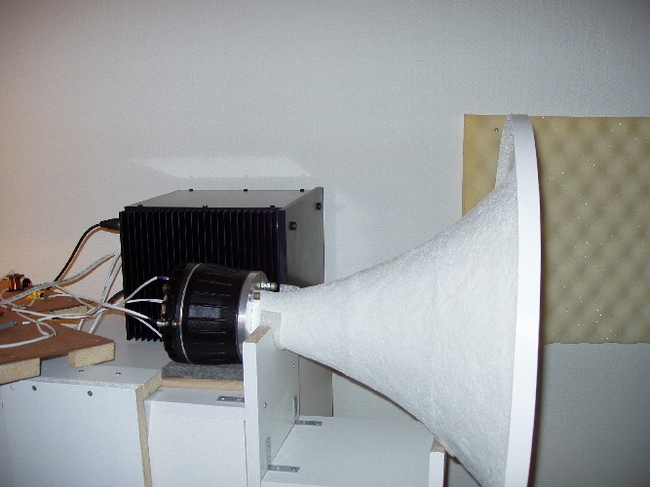
|
Commends to the low mains voltage at Peters house:
We have had some problems of the small Hahn PCB transformers, which have been used on all of our power supplies for DCN23.
We started out using a 2 x 7,5V transformer which performed as supposed to. But in later series of this transformer - it didn't
perform as it should due to higher losses within the transformer itself. To get the current the DCN23 needs we replaced the 2 x 7,5V
with 2 x 6V (same size and VA) and all worked well - we thought, but at lower mains voltages there isn't enough to regulated on with the standard
capacitor for the 7,5V transformer, so now we recommend replacing the 1000uF with 2200uF on the Vcc supply or on all of the supplies.
This ensures operation down to about 215Vac.
We tried all these fixes on Peter's amps without success - because his mains voltage got even lower. He have measured as low as 204Vac
and a special supply arrangement was need and made.
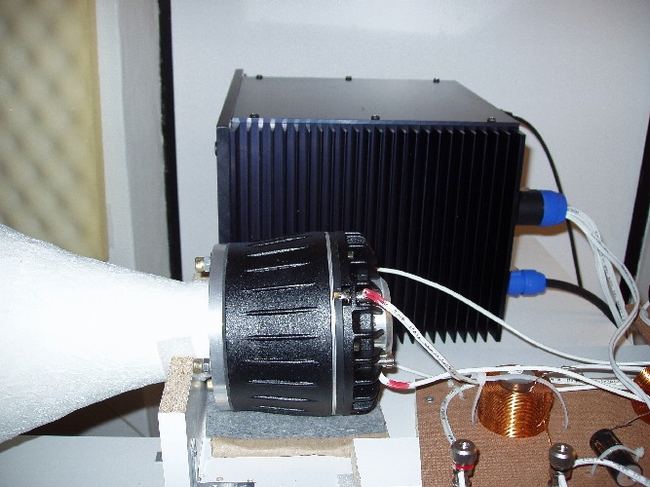
Peter has told me that he will incorporate a midrange horn to make a better coverage of the range above the bass horn and below
high frequency horn - now that the amplifier solution is there. He's also considering a new compression driver - let's see
what he comes up with...
Update:
New horns and new drivers
Peter has send me new pictures and describtion of his latest update of his active horn-loaded system:
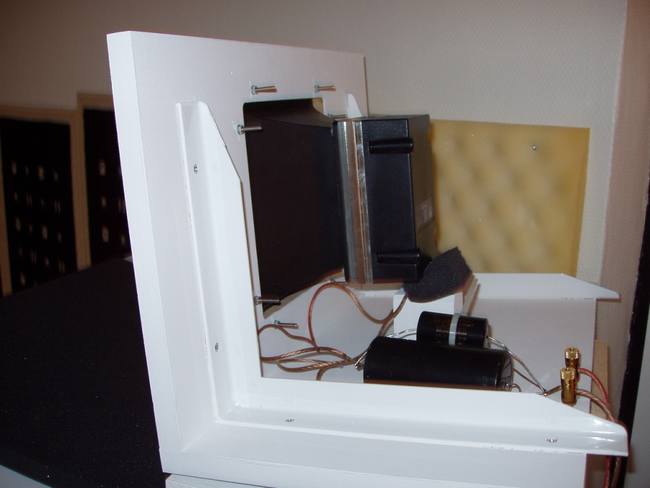
Peter writes July 2009:
This is an update regarding my horn system. I have now dropped the compression drivers and incorporated a new mid horn.
The system as it is now is still fully horn loaded and 3-way, though:
Bass (same since 2004): Straight, 29 Hz, hyperbolic-exponential (T=0.6) bass horns each loaded with double 15" PD.158
woofers from Precision Devices.
Mids (fairly new): Conical front horns loaded with 5.25" P.Audio WN-520N drivers
Highs (new): Horn loaded AMT pro driver from Beyma (model TPL-150H).
The system is actively tri-amped using digital crossovers and SS amps from GroundSound! Crossover points are 260 Hz
and 1300 Hz using 8th order slopes all through.
While the 2" BMS 4592 ND compression drivers definitely had their advantages with regard to dynamics and headroom,
I never really managed to get them sound as natural as I would prefer. I also tried other compression drivers/horns,
and even though a combo using a 2" Community M200 and 1" B&CDE25 was somewhat more relaxed and 'open' sounding than
the BMS, I was never really pleased with the sound.
By using a light cone driver with a very strong motor (5.25" P.Audio WN-520N: Mms=10.61g; BL=16.43; Qt=0.20) in a
conical horn, I believe I have found a good balance between the naturalness and presence of the AER MD3 full rangers
that I had at some point on acoustic music on the one side and the weight and impact on rock music that I got from
the compression drivers on the other. I actually tried out several cone drivers for the mid horn, but the little P.Audio
driver came out on top! It is super fast, clear, and clean!
The pro Beyma AMT TPL-150H is a nice tweeter. It has a max SPL around 120 dB and cannot ultimately go as loud as the
compression drivers, but 120 dB is more than enough for a home rig - at least for me! The TPL delivers very fast, clean,
and clear highs, while still sounding very natural. Some of the records that I (almost) could not stand listening to with
compression drivers are now listenable again. S- and T-sounds sound just right (with the BMS sibilance was simply too much)!
Besides sounding natural and open, I like the larger sweet spot using CD horns.
I have also changed the pre amp. The eAR Pre sounded really good, but I got tired of messing around with the very sensitive
attenuator, where the difference between 7 and 8 o'clock on the volume control with regard to subjective SPL corresponded to
a difference between silence and "we'll call the police"-levels. I had the opportunity to get my hands on a the little
Embla Erato digital volume control and buffer second hand, but was a little afraid that it could not drive the DCN23.
I asked Robert, who kindly looked into the specs (thanks!) and said that it would probably work - and it did!
The GroundSound blocks? They are keepers for sure. I am still very satisfied with their performance.
Best regards
Peter
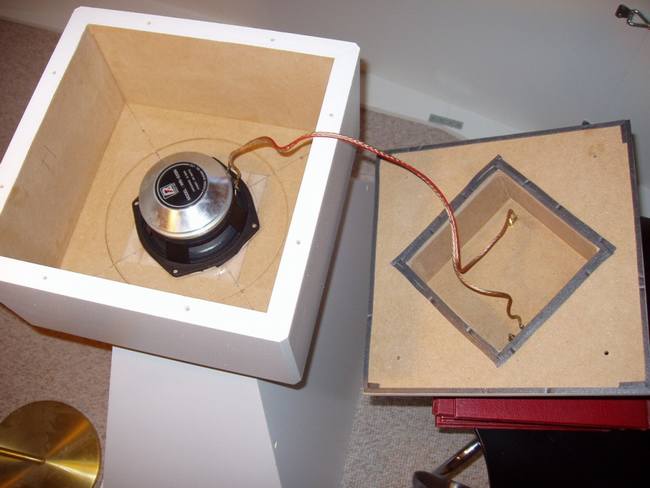
Mid-horn cabinet
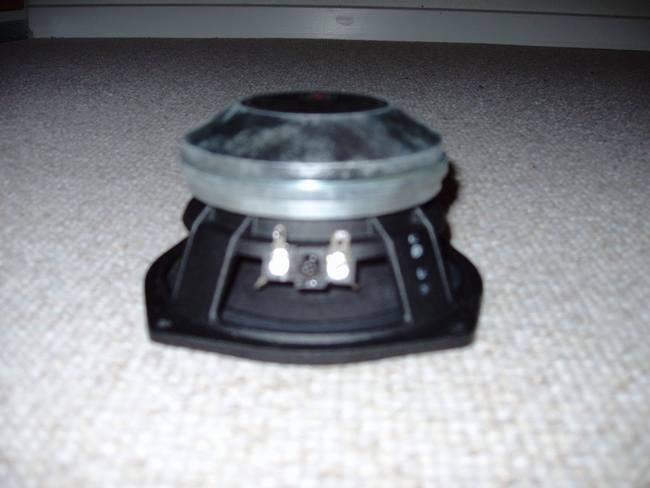
P.Audio WN-520N
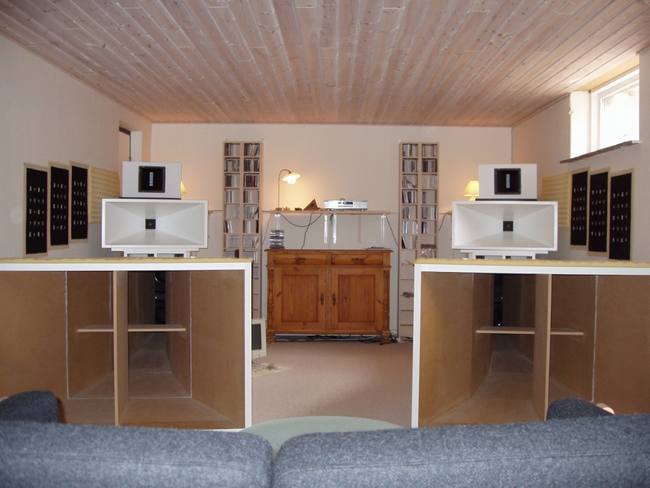
An overview of the new system in the drivers "seat" - ready to rock...
|
|
|
|
 active@groundsound.com
active@groundsound.com
 active@groundsound.com
active@groundsound.com